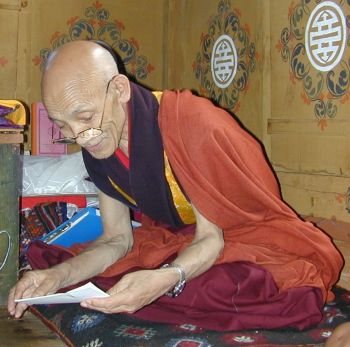「Lama Pema Tsewang /喇嘛貝瑪策旺/」修訂間的差異
SSTC Bubble(對話 | 貢獻) 小 (已匯入 1 筆修訂) |
SSTC Bubble(對話 | 貢獻) 小 (已匯入 1 筆修訂) |
(無差異)
| |
於 2015年7月24日 (五) 22:10 的修訂
Lama Pema Tsewang aka Lopön Pemala (1926 - 2009) was a main buthanese student of Dudjom Rinpoche, an a main support for the spread of the Dudjom Tersar lineage in modern Buthan.
Birth, Family
Lama Pema Tsewang was born in 1926 in the Chume (Wyl. chu smad) valley of Bumthang (Wyl. bum thang). At a young age, he began his education under the guidance of his grandfather during which he mastered all the basic necessary texts[1]
Training
After, Lama Pema Tsewang enterered Nymalung Monastery. He received teachings from many masters, including:
- Dilgo Khyentse Rinpoche
- Dudjom Rinpoche
- Drubgyu Rinpoche
- Katok Ngawang Trinle
- Khenchen Tubten Kunga Gyeltsan
- Khunu Lama Tenzin Gyaltsen
- Ngor Khenpo Ngawang Yonten GNyimalungyatso
- Tranggo Tokden
- Thinley Norbu Rinpoche
Activity
In 1961, the Third King of Bhutan, Jigme Dorje Wangchuck instructed Lama Pema Tsewang to join the newly established Rikzhung Institute at Semtokha as one of its tutors. There, he oversaw the needs of about one hundred students each day. Lama Pema Tsewang took a leading role in helping the King Jigme Dorje Wangchuck’s ambition that all Bhutanese should be able to read and write the national language of Dzongkha, as part of his plan to modernize the nation. In 1973, Lama Pema Tsewang was transferred to Thimphu as the Director of the National Library. He composed a history of Bhutan: “The History of Bhutan: The Luminous Mirror to the Land of the Dragon”. After his retirement from the Government services in 1993, Lama Pema Tsewang was able to fulfill a long pending request from the monastic community and the people at large by accepting the position of abbot at, where he had begun his religious life at the age of twelve. Lama Pema Tsewang, affectionately known as Lam Pema-la, continued to teach to students and monks until his passing in March 2009.
External Links
Notes
- ↑ Information based on the biography founded on "Treasury of Lives".
